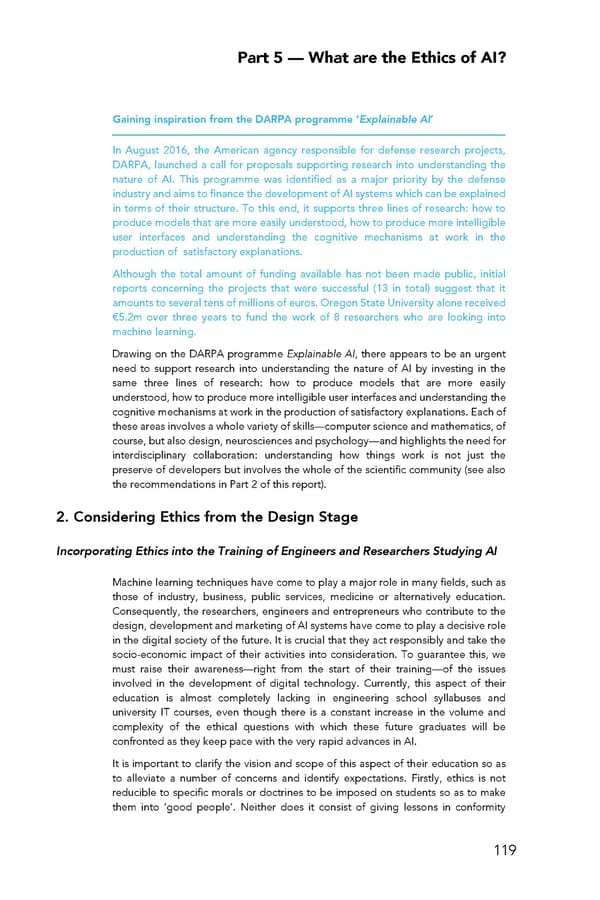Part 5 — What are the Ethics of AI? Gaining inspiration from the DARPA programme ‘Explainable AI’ In August 2016, the American agency responsible for defense research projects, DARPA, launched a call for proposals supporting research into understanding the nature of AI. This programme was identified as a major priority by the defense industry and aims to finance the development of AI systems which can be explained in terms of their structure. To this end, it supports three lines of research: how to produce models that are more easily understood, how to produce more intelligible user interfaces and understanding the cognitive mechanisms at work in the production of satisfactory explanations. Although the total amount of funding available has not been made public, initial reports concerning the projects that were successful (13 in total) suggest that it amounts to several tens of millions of euros. Oregon State University alone received €5.2m over three years to fund the work of 8 researchers who are looking into machine learning. Drawing on the DARPA programme Explainable AI, there appears to be an urgent need to support research into understanding the nature of AI by investing in the same three lines of research: how to produce models that are more easily understood, how to produce more intelligible user interfaces and understanding the cognitive mechanisms at work in the production of satisfactory explanations. Each of these areas involves a whole variety of skills—computer science and mathematics, of course, but also design, neurosciences and psychology—and highlights the need for interdisciplinary collaboration: understanding how things work is not just the preserve of developers but involves the whole of the scientific community (see also the recommendations in Part 2 of this report). 2. Considering Ethics from the Design Stage Incorporating Ethics into the Training of Engineers and Researchers Studying AI Machine learning techniques have come to play a major role in many fields, such as those of industry, business, public services, medicine or alternatively education. Consequently, the researchers, engineers and entrepreneurs who contribute to the design, development and marketing of AI systems have come to play a decisive role in the digital society of the future. It is crucial that they act responsibly and take the socio-economic impact of their activities into consideration. To guarantee this, we must raise their awareness—right from the start of their training—of the issues involved in the development of digital technology. Currently, this aspect of their education is almost completely lacking in engineering school syllabuses and university IT courses, even though there is a constant increase in the volume and complexity of the ethical questions with which these future graduates will be confronted as they keep pace with the very rapid advances in AI. It is important to clarify the vision and scope of this aspect of their education so as to alleviate a number of concerns and identify expectations. Firstly, ethics is not reducible to specific morals or doctrines to be imposed on students so as to make them into ‘good people’. Neither does it consist of giving lessons in conformity 119
 For a Meaningful AI - Report Page 118 Page 120
For a Meaningful AI - Report Page 118 Page 120